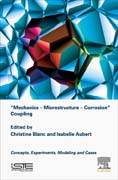
Mechanics - Microstructure - Corrosion Coupling: Concepts, Experiments, Modeling and Cases
Blanc, Christine
Aubert, Isabelle
Mechanics - Microstructure - Corrosion Coupling takes stock of the state of the art of scientific and technological developments related to the durability of materials and structures subjected to mechanical and environmental stress coupled or decoupled. This type of issue affects different industrial sectors such as energy, aeronautics, chemistry or the oil industry. Experimental, theoretical and numerical aspects will be tackled at different scales. The objective is to provide its readers with the most advanced tools and scientific approaches to: Apprehend the coupling phenomena through the understanding of the associated mechanisms and, thus, to identify the variables of the first order among those related to the mechanical state, the material or the chemical environmentPropose strategies to control and / or extend the lifespan of structures in a multi-process coupling situation. For this, the physicochemical, mechanical and metallurgical bases of the mechanical-environment-microstructure interactions will be taken up again, then the focus will be on the latest advances in research in these areas (hydrogen embrittlement, stress corrosion, fatigue, etc., especially on the consideration of the multi-scale aspect of the phenomena in the implementation of dedicated experiments as in the modeling of the behavior and the damage of the structures. Reviews the status of scientific and technological developments related to the durability of materialsAddresses experimental, theoretical and numerical aspects at different scalesProvides the most advanced tools and scientific approachesFocuses on the latest advances such as (hydrogen embrittlement, stress corrosion, fatigue, etc.) INDICE: Part 1. The Basics for Understanding Mechanics-Environment-Microstructure Couplings 1. Environmentally Assisted Cracking 2. The Basics to Better Understand Couplings in Physical Metallurgy 3. Continuum Mechanics 4. Fatigue Crack Initiation and Propagation 5. Surface Chemistry and Passivation of Metals and Alloys 6. Electrochemistry for Mechanicallyassisted Corrosion 7. Modeling Tools: From the Atom to the Macroscopic Scale Part 2. Hydrogen and the Embrittlement of Metallic Materials Ad/Absorption, Trapping and Transport Mechanisms 8. State of Hydrogen in Matter: Fundamental Ad/Absorption, Trapping and Transport Mechanisms 9. Hydrogen and Crystal Defects Interactions: Effects on Plasticity and Fracture 10. Industrial Consequences of Hydrogen Embrittlement 11. Experimental Techniques for Dosage and Detection of Hydrogen Part 3. Stress Corrosion Cracking 12. Effect of Stress/Strain Fields on Electrochemical Activity: Metallurgy/Stress Interaction and Surface Reactivity 13. Stress Corrosion Cracking. Between the Corrosion Defect and the Long Crack: the Phase of the Initiation of the Cracks 14. Stress Corrosion Crack Propagation 15. Oxidation-assisted Cracking 16. Stress Corrosion Cracking: From In-service Cracking to Laboratory Studies Part 4. Corrosion Fatigue 17. Corrosion and Hydrogen Fatigue at Different Scales 18. Local-scale Modeling of Plasticity-Environment Interactions 19. Specific Cases of Corrosion Fatigue Part 5. Additional Information and the Paths to Solving Interrelated Problems 20. Local Electrochemical Methods Adapted to Studying Environment-Microstructure-Mechanics Couplings 21. Mechanical Tests in Corrosive Environments and Under Gaseous Hydrogen 22. Liquid Metal Embrittlement
- ISBN: 978-1-78548-309-7
- Editorial: ISTE Press - Elsevier
- Encuadernacion: Cartoné
- Páginas: 610
- Fecha Publicación: 01/03/2019
- Nº Volúmenes: 1
- Idioma: Inglés
